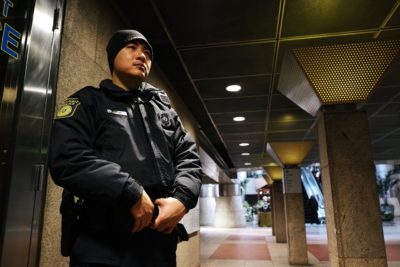
In light of the recent opioid epidemic sweeping across the state, the Massachusetts Bay Transportation Authority Transit Police have announced their intent to equip all police patrolmen with the opiate overdose-reversing medication, naloxone, by the end of the year.
Transit Police officers currently have to wait for first responders to arrive in the event of an overdose, but by providing the 210 patrolmen with Narcan, the device that contains naloxone, and training them in its use — expected to happen by the end of the year — they will be able to act immediately, according to an Oct. 19 Boston Herald article.
Opioid-related overdose deaths in Boston have more than doubled in the past five years, increasing from 70 in 2012 to 196 in 2016, according to a Massachusetts Department of Public Health report.
The T has been impacted by the crisis in recent years, with an increase in opioid overdose calls being reported by the agency, according to the Herald. In the past year alone, Transit Police have responded to 93 medical emergencies — which includes overdose incidents — with three being fatal.
Jared Owen, a spokesperson for the Massachusetts Organization for Addiction Recovery, wrote in an email the MBTA’s new initiative is an important step in combating the opioid crisis.
“With the emergence of fentanyl and other powerful synthetic opioids, overdose rates are the highest they have ever been in this state,” Owen wrote. “It makes complete sense that officers patrolling these stations should have the proper tools to save someone’s life. We believe that all first responders should carry Narcan.”
Owen wrote the MBTA could do even more to help by expanding its training further.
“We hope the MBTA is able to offer training on overdose response not just to officers but all staff members,” Owen wrote.
While Narcan administration does initially prevent overdoses, Owen wrote, it must be followed up with more intensive medical care.
“Individuals that have overdosed and been revived with Narcan still need to receive medical attention,” Owen wrote. “The effects of the Narcan can wear more quickly than the opioid agonist drug in a person’s system. This means that they can re-overdose after being revived with Narcan.”
Matthew Hoffman, executive director of Boston Alcohol and Substance Abuse Programs, Inc., said drug abuse in public spaces like transit restrooms is a common issue due to their accessibility.
“As soon as you get your drugs, assuming you’re in withdrawal, which generally people are just before they use their dose of drugs, you want to do it as quickly as possible, so you’re not feeling the effects of withdrawal,” Hoffman said.
Hoffman stressed the importance of educating MBTA staff on where and how people overdose.
“It’s kind of tough to patrol a bathroom, but you really need to, otherwise somebody could overdose and just be lying there for who knows how long,” Hoffman said. “So just in general, [the MBTA should] make their staff more aware of what an overdose looks like and how to deal with it. They’re part of the treatment team for all practical purposes.”
Several Boston residents expressed their support for the program and considered how the MBTA could do even more to prevent potential overdoses.
Kristine Coelho, 21, of Fenway, said she has seen the life-saving effects of naloxone and supports its use by the MBTA.
“I know somebody personally who has a drug addiction really terribly, and without Narcan, I don’t know if he’d still be alive to be honest with you,” Coelho said. “So if it can save a person’s life, all for it.”
Brian Dyer, 51, of the South End, said the MBTA should ensure transit officers know where to look for potential opioid overdoses.
“The T Police know that people go into the bathroom on T property and do heroin, so they need to be vigilant of the bathrooms,” Dyer said.
Amanda Hunt, 27, of South Boston, said the MBTA initiative is a step in the right direction.
“It’s a great idea, I don’t think there’s really a reason for them not to have it,” Hunt said. “There’s definitely a need, and if anything it’s just going to come in handy sometimes.”
Jennifer Small is a junior in the Boston University College of Communication, majoring in journalism and minoring in media science. She is one of the Co-Campus News Editors for Spring 2023.

